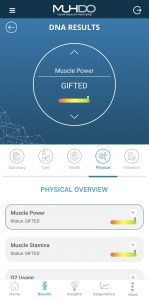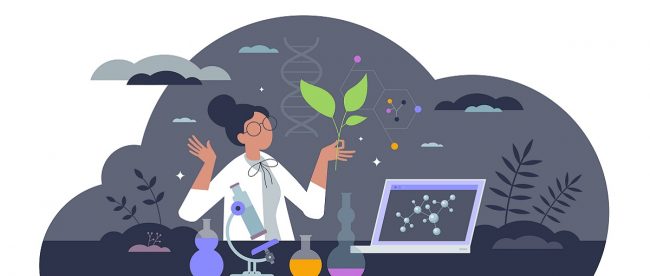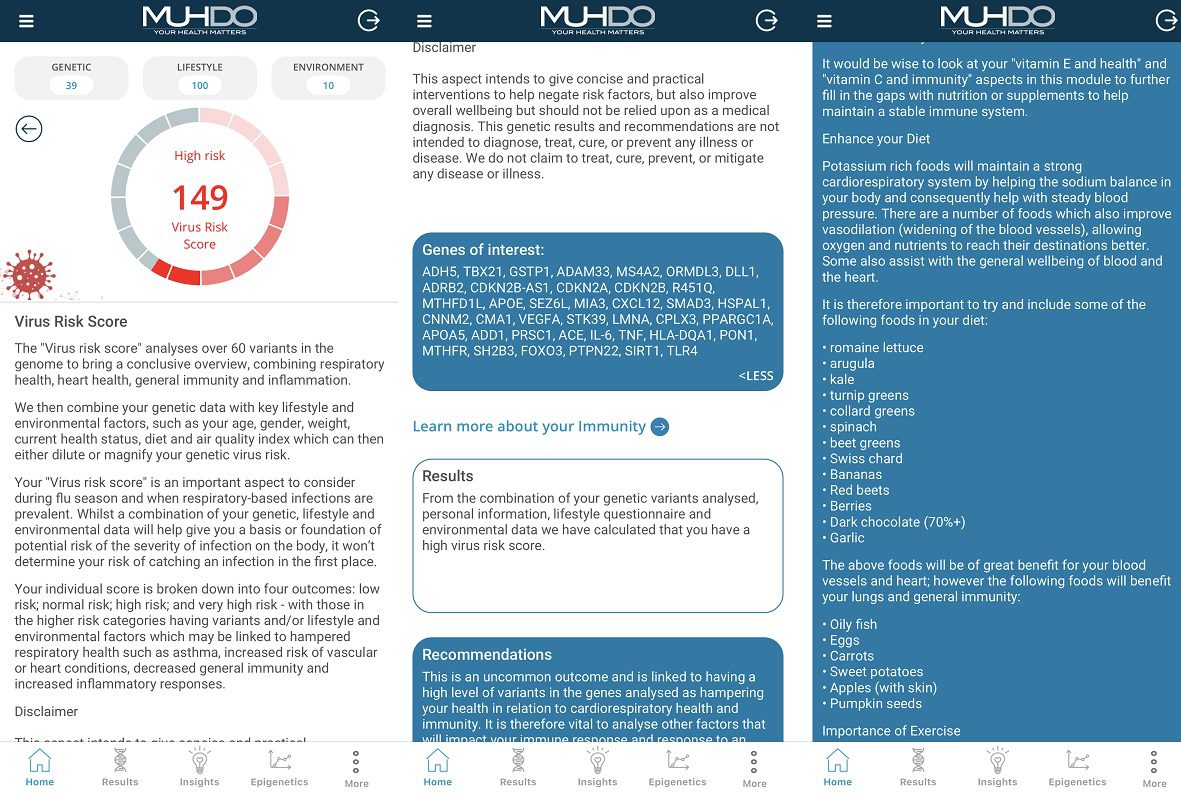I got DNA profiling to determine my diet and health
Is your weight and health a foregone DNA conclusion?
I tried DNA profiling to find out more about my diet, my health, and my genetic makeup. And ultimately what I can do with that information…
I’m a 53-year-old woman and like everyone, my feeds are filled with targeted ads. Top of the list appears to be ‘comfy’ bras, which is hilarious as I don’t wear bras (hoping the stupid tracking cookies pick that up now). But a very close second are swathes of companies touting hormonal weight loss solutions. Particularly aimed at menopausal women.
It’s 2023 and we all know that hormones affect your weight. Stress hormone cortisol helps makes you fat. Leptin, insulin, oestrogen etc influence our appetite, metabolism, and body fat distribution. At a time of my life when hormones are in flux, this seems a sensible thing to look at.
Is my weight and health trajectory written in the DNA stars?
But I wanted to take this one step further and look at my genetic makeup, and how that influences my body and health. Is my weight and health trajectory written in the DNA stars? How much of what makes up my DNA profile affects whether I’m fat, thin, healthy, have a heart problem, lose my marbles…
So I found Muhdo, and got in touch to explore my DNA destiny
Muhdo is a company that offers a bunch of bioinformation and epigenetic data services. For the purposes of this article, I picked the straightforward ‘DNA Health’ package (£125), although I think I have epigenetic data to follow. I can come back to this later if that’s the case.
They sent me a smart box in the post, with easy instructions and a reply-paid container to return my saliva sample in. I downloaded the app, answered all the questions, popped my drool in the post, and about two weeks later I got a text saying my results were in.
Crunch time
The first thing I see when I get the results is that I have a high ‘virus risk’ score. Great. There’s a list of ‘Genes of interest’ that relate to this (and to all the results), and underneath each result an explanation and some advice. I’ve screenshot some of this so you can see what it looks like, but missed out the bits about washing my hands properly and getting exercise, because, well duh.
As for the rest of it; well, it’s a very mixed bag. I’m going to go through just some of my key results here, because there is MASSES of information. It’s really interesting, actually. And each result, whether it’s good, bad, or indifferent, is accompanied by a breakdown of the genes, the condition, supportive advice and dietary advice, and a bunch of helpful links. There’s a lot of work gone into this.
Diet
Let’s start with the juicy stuff. The results are displayed in sliders that go from red to green, and here I’m a reasonably solid amber/normal average. My response to carbs is Normal, as is my ‘snacking risk’ (“Your genetics link you to a normal likelihood to snack”), metabolic rate, and fat distribution.
Talking of fats – neither saturated fat nor unsaturated fats are particularly my friends when it comes to weight. But interestingly I wouldn’t gain as much benefit from focusing on unsaturated fats as someone with a different genetic variant. The advice around fats for me is a mix – nut oils, flaxseeds, sardines, salmon, tofu are best. But saturated fat is also ok, and helps with the absorption of vits A, D, E and K. So easy on the fats for me, but not to obsess about cutting out saturates.
…my genetics apparently mean I’m not linked to a particularly strong fondness for sweet-tasting foods
In the green/positive corner I have a Good response to protein, which is useful to know, and there’s a list in the helpful bit about amino acids and the sources thereof. And my genetics apparently mean I’m not linked to a particularly strong fondness for sweet-tasting foods.
This feels right. I don’t really like sweet things like cake or chocolate. I’m not mad for puddings and will generally go for the cheese board at a restaurant. So I’m a bit surprised – and sad – to see that my genetics may cause me to be more sensitive to lactose, particularly as I age. And it’s the same with my sugar response, which is not just sugar, but all simple carbohydrates; sucrose, lactose, fructose, maltose (cereal grains) and so on.
I scoffed, thinking of how much I love a cheese sandwich. I eat loads of them! And then it dawns on me that I’m actually really fatigued. A lot. Could it be… could it be bread and cheese that’s doing this? Oh my god.
Read more: How to generate more collagen in a vegan or vegetarian diet
Health and Physical
Bit of a mixed bag here – and these are two separate sections. I’m lumping them together because ‘Health’ only has five areas.
 On the Health section, I’m Normal for bone mineral density, obesity risk, and diabetes risk, so I can’t blame the spare tyre on genetics. Interestingly I have a sensitivity to caffeine, which again feels right. I can’t tolerate more than one cup of coffee before getting all antsy. And like the virus risk, I’ve got a higher than average chance of having colds and flus “compared to most people.”
On the Health section, I’m Normal for bone mineral density, obesity risk, and diabetes risk, so I can’t blame the spare tyre on genetics. Interestingly I have a sensitivity to caffeine, which again feels right. I can’t tolerate more than one cup of coffee before getting all antsy. And like the virus risk, I’ve got a higher than average chance of having colds and flus “compared to most people.”
Into the Physical and I’m thrilled to see that there are THREE sections in which I am Gifted. These are muscle power, muscle stamina, and power-to-weight ratio. I’m STRONG AS ALL HELL! I’m in roughly the top 15% of all people tested.
I also have an ‘above normal’ O2 usage. “You have gifted variants for oxygen usage… an increased VO2 max can lead to greater blood vessel dilation and therefore more nutrients being delivered around the body.” Perhaps this helps to inform the lower risk of inflammation that I also enjoy. “You have a lower inflammatory response and the genetic markers linked to inflammation are favourable for you.” Excellent.
The rest of the Physical section is firmly in the Normal zone, and that’s my anaerobic threshold, recovery rate, muscles mass, injury risk, lean body mass, and exercise effect on weight. Have to say, I’m pretty chuffed with the physical results. It’s a bit late for me to become a professional body builder, but this information is going to be useful at the gym.
There is a lot of data and information
You don’t really need to read much more about my results; there’s a heck of a lot of data. The vitamin profiling is interesting actually – I have a greater risk of vit D and selenium deficiency, for example, and would benefit from plenty of omegas and choline (had to look that one up). And again, there’s advice about where to get these things in your diet.
You can also download your raw genetic data, although goodness knows what you’d do with it
As well as the results, you get an outline Health Plan, a breakdown of your ‘DNA Diet’ balance which includes your metabolic rate, what your macros should be, when you should eat the most calories through the day, and a bunch of other guidance.
You don’t get a designed diet although I suspect that will come. What you do get though is the opportunity to set up your own tailored training plan based around your genetic results. You can also download your raw genetic data, although goodness knows what you’d do with it. I downloaded mine, just to have a look. It’s a weird feeling, seeing your very existence displayed as a massive list of numbers and codes.
Can it predict disease and death risk?
This is one of the questions I asked when interviewing Muhdo’s Wez before leaping into this. Would my DNA profile be able to predict whether I would be more likely to have cancer, dementia, a heart attack. He was keen to point out that this is not what Muhdo do – they’re about health and lifestyle. The option to delve deeper into those potential morbidity risks are available, but Muhdo doesn’t do this. And honestly, would you want to know?
“Apart from anything,” Wez said, “what a massive responsibility to deliver that sort of news to someone, you will probably get cancer. No, what we do is look at your genetics to help you improve your health, based on your makeup. That’s all.”
Muhdo don’t just do DNA reports though. There are brain training exercises, face scans/skincare analysis, and blood tests for things like cholesterol, antibody profiles, and thyroid performance.
So what next?
I’m going to take the information I have and make some lifestyle changes. Actually, I’m probably going to read it all again, and re-read it, because there’s a lot. But it feels like useful information to have, so I should use it.
I can see sugar, dairy and wheat taking more of a back seat, although I don’t plan to be militant about this. I’ll definitely bump up the Vit D, particularly as the shorter days draw in, and choline, which impacts liver function, healthy brain development, muscle movement, your nervous system and metabolism.
I’ll look into selenium, which is important for thyroid function, metabolism, and the immune system. For someone who is a bit tubby and will probably catch colds, this definitely sounds like a good thing to increase my intake of.
In terms of exercise and my awesome physical genetics I shall carry on doing nice long dog walks, but in the gym I will focus more on weights and resistance exercises. It’s something that’s advised for people over 50 anyway, so that’s all good.
Your data
If you’re worried about security and anonymity, Wez is keen to reassure me that I’m well protected. In the FAQs section of the site it states: “All our customers’ genetic data is triple locked. First our customers are anonymous to us in the database. Each customer is given a unique ID number, it is only with this code that the customer can unlock the data and have it displayed on their private mobile app. Secondly all customer data is encrypted throughout the data journey. So if anyone were to capture our data it would be both anonymous and encrypted. Thirdly we store customer genetic data on secure AWS servers.”
As for me…
I will be curious to see if the changes make me feel healthier and fitter, and if I lose weight. I’m interested also in the fact that some of the results felt completely right – like not having a sweet tooth, or being sensitive to coffee. But others less so – I’ve always assumed that I was able to tolerate wheat and dairy just fine, but hey. Maybe not.
If biohacking is something that interests you, this seems like a good place to start. I’ll let you know how I get on!

Sam is Silver’s founder and editor-in-chief. She’s largely responsible for organising all the things, but still finds time to do the odd bit of writing. Not enough though. Send help.




Leave a comment